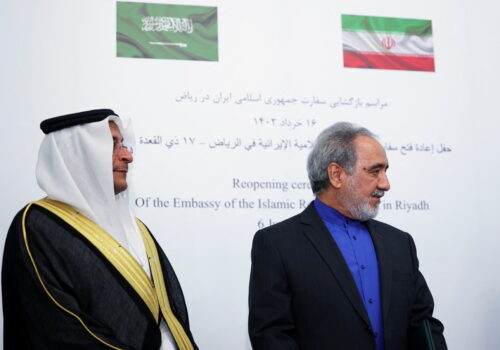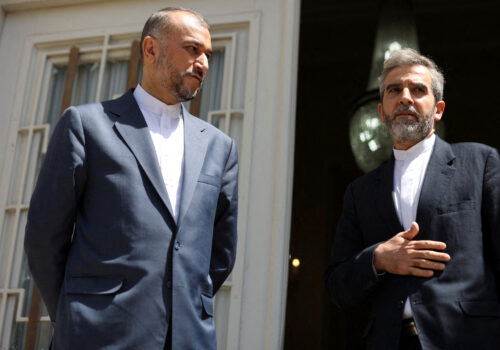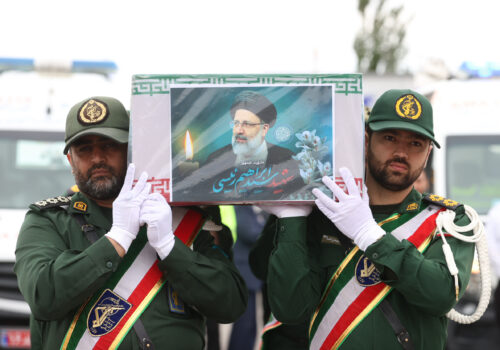Will Bahrain and Iran turn a new page? There’s been talk of it.
While visiting Moscow on May 23, Bahrain’s King Hamad bin Isa Al Khalifa told Russian President Vladimir Putin that his country sees “no reason to delay with normalization of relations” with Iran. The king also said that Manama has ceased having problems with Tehran. “We are trying to establish normal diplomatic, trade, and cultural relations with it,” explained King Hamad, who relayed that same message to Chinese Premier Li Qiang eight days later in Beijing.
Earlier this month, Bahrain formally requested that Russia facilitate its renormalization with Iran. This is significant given the extent to which Bahrain’s ruling order has perceived a grave Iranian threat since the 1979 revolution. On April 8, King Hamad pardoned 1,584 prisoners—many of whom were detained for their Arab Spring activism in 2011. Then Foreign Minister Abdullatif bin Rashid Al Zayani attended President Ebrahim Raisi’s funeral on May 22 after King Hamad sent his condolences to Supreme Leader Ayatollah Ali Khamenei. These moves earned the Arab monarchy goodwill in Tehran.
Reduced tensions in Bahraini-Iranian affairs, and Manama and Tehran’s greater willingness to engage the other, are best understood within the context of regional developments in the past several years. Lower temperatures in the Persian Gulf—specifically, improvements in Saudi Arabia and the United Arab Emirates’ (UAE) relations with Iran—have created an environment for more tempered ties between Manama and Tehran.
In March 2023, Saudi Arabia and Iran renormalized diplomatic relations with Omani and Iraqi help, which later led to a China-mediated agreement following seven years and two months of severed diplomatic ties. The UAE and Iran restored full-fledged diplomatic relations in 2022, following Abu Dhabi’s downgrading of bilateral ties with Tehran in 2016. Saudi Arabia and the UAE determined that more dialogue with Iran would advance their security and economic interests with both Persian Gulf states focused on internal development and economic diversification. For Iran, better relations with Gulf Cooperation Council (GCC) members factored into the Raisi administration’s “Neighbors First” strategy, which sought to decrease Tehran’s regional isolation as a means of countering the impact of Western sanctions.
SIGN UP FOR THIS WEEK IN THE MIDEAST NEWSLETTER
For Bahrain, which takes its foreign policy directives from Saudi Arabia and the UAE, following in Riyadh and Abu Dhabi’s footsteps vis-à-vis the Islamic Republic is logical. Nonetheless, even if Bahrain and Iran renormalize this year, distrust and suspicions will probably continue shaping their relations.
Historic threat perceptions of Tehran
Understanding why Bahrain’s royal family sees the Islamic Republic as a predatory state requires going back to the chaotic period in the aftermath of Iran’s 1979 revolution. With Ayatollah Ruhollah Khomeini and his loyalists calling for exporting their Islamic revolution to foreign countries, the Sunni authorities in Shia-majority Bahrain felt particularly vulnerable to Iran’s extremely ideological foreign policy, which was gripped with revolutionary fervor in the 1980s.
Bahraini officials were not paranoid. There was the failed coup plot of 1981, which entailed the Islamic Front for the Liberation of Bahrain (IFLB) trying to create a “free Islamic order” and eject the US military presence from the Persian Gulf archipelago. Grand Ayatollah Mohammad Taqi al-Modarresi established the IFLB in Iran, and the group’s attempt to oust the Al Khalifa family in Bahrain greatly informed GCC state officials’ perceptions of the proxy threat posed by the Islamic Republic. Then, in 1996, authorities in Manama once again accused Iran of attempting to stage another coup in Bahrain.
In 2011, a Shia-dominated Arab Spring uprising erupted in Bahrain, raising concerns about regime stability and even survival. Whether Iran was directly involved is a question for another article. But Tehran gave moral support—if nothing else—to Bahrainis demanding major change. Manama and other GCC states saw an Iranian hand in Bahrain’s Arab Spring movement and intervened militarily to suppress the protestors.
Since 2011, some hardline Bahraini Shia factions—such as Saraya al-Mukhtar, also known as the Bahraini Islamic Resistance—have waged violence in Bahrain. Founded in 2013, Saraya al-Mukhtar receives logistical support from the Islamic Revolutionary Guard Corps (IRGC), according to Washington. Perceiving this group as a threat to US interests, the State Department designated it a terrorist entity in 2020, and did the same with another Iran-backed Bahraini Shia group, the al-Ashtar Brigades, in 2018.
Beyond sectarian and ideological factors, Iranian officials, before and after 1979, have made territorial claims to Bahrain based on the history of Persian control of the archipelago dating back to ancient times. In 1957, the Iranian parliament under Shah Mohammad Reza Pahlavi passed a bill recognizing Bahrain as Iran’s fourteenth province (Mishmahig), which heightened concerns in Arab capitals and London about the shah’s hegemonic aspirations. However, by 1970, Tehran recognized Bahrain’s independence in line with United Nations Security Council Resolution 278.
Yet, in 1980, Ayatollah Sadeq Rohani said that Tehran’s recognition of Bahrain’s independence a decade earlier was invalid because it occurred under the shah’s rule. By the early 1980s, Iranian officials were discussing the oppression of Shia Muslims in the Gulf Arab kingdom, and Khomeini’s revolutionary agenda inspired segments of Bahrain’s Shia population to stage pro-Iranian demonstrations.
At least until recently, Iranian state media have continued advancing narratives about Iranian sovereignty over Bahrain. This has often been a way of keeping the leadership in Manama on edge amid rising tensions between the kingdom and Tehran, especially in the aftermath of Bahraini-Israeli normalization in 2020, which Iran found particularly disturbing.
What’s next?
Bahrain was one of the Arab states to fully sever diplomatic relations with Iran after mobs stormed the Saudi missions in Tehran and Mashhad in 2016 in response to Riyadh executing Shia cleric Nimr al-Nimr. While heavily dependent on Saudi financial and security assistance, Bahrain unsurprisingly showed solidarity with Riyadh during that episode. It committed itself to backing Saudi-led Arab efforts to intensify pressure on Iran following the attacks.
Nonetheless, with Saudi Arabia and Iran restoring diplomatic relations in March 2023, Saudi pressure on Bahrain to maintain its hardline stance against Iran has dramatically eased. Similarly, Sudan—another country that depended on Riyadh and Abu Dhabi financially—cut off relations with Iran amid the 2016 Saudi-Iranian crisis only to renormalize ties with the country seven months after Riyadh and Tehran signed their diplomatic agreement in Beijing. Similarly, the Saudi-Iranian détente has opened the door to improved relations between Egypt and Iran.
It’s worth noting that Oman has been a critical bridge between Bahrain and Iran, as Muscat has long been between other Arab and Western states, on one side, and Tehran, on the other. Last year, Sultan Haitham visited Manama to discuss the process of mending fences between the neighbors.
Of the five GCC states that took diplomatic action against Iran in 2016, Bahrain remains the only one that, as of writing, has not reversed its move against Iran amid that crisis. Bahrain’s renormalizing relations with Iran would mark the final step in the process of moving past the overall GCC-Iran break from early 2016. Similarly, it was Bahrain, of all Arab states in what was an anti-Qatar bloc, that reconciled last with Doha after the 2017–2021 blockade was lifted at the al-Ula summit in 2021.
Whereas other GCC states tend to perceive an Iranian threat as one that mostly pertains to the regional balance of power, to Bahrain’s ruling elites the Islamic Republic represents nothing less than an existential threat to the country’s national security and the Manama regime’s survival. Therefore, it is understandable why Bahrain has moved toward renormalization with Tehran at the slowest tempo of any GCC member.
Given Bahrain’s internal dynamics, it is reasonable to expect any Bahraini-Iranian détente to have less depth than the Saudi and Emirati détentes with Tehran. A renormalization of Bahrain and Iran’s relationship could lack significant substance, and would mostly be about restraint in rhetoric.
A real marker of progress would be Iranian state-linked media outlets ceasing to challenge Bahrain’s territorial integrity and independence. Another would be Tehran cutting off relations with hardline and militant Bahraini factions. Without Iran making such changes, there is good reason to question what a renormalization of diplomatic relations could achieve from the Bahraini government’s perspective.
On the Iranian side, Bahrain’s relationships with the United States and Israel leave Tehran feeling extremely vulnerable. While it is doubtful that Bahrain would either stop hosting the US Navy’s Fifth Fleet or abrogate its normalization accord with Tel Aviv, Bahrain could take steps to signal its commitment to better relations with Tehran by ensuring that Bahraini territory will not be used by any foreign power for purposes of military action against Iran or its regional allies. Bahrain’s government becoming more tolerant of moderate elements within the Shia opposition and releasing more political prisoners would also bode well for better relations with Iran.
Perhaps it’s difficult to imagine both sides taking these steps. But it’s not impossible.
Giorgio Cafiero is the chief executive officer of Gulf State Analytics, a Washington, DC-based geopolitical risk consultancy, and an adjunct assistant professor at Georgetown University.
Further reading
Wed, Mar 6, 2024
A year ago, Beijing brokered an Iran-Saudi deal. How does détente look today?
IranSource By Giorgio Cafiero
Tehran and Riyadh saw dialogue as the only viable way to reduce tensions, and realized that further escalating hostilities would not advance either’s national interest.
Fri, May 31, 2024
A nuclear negotiator takes the helm of Iran’s foreign ministry. So what’s next?
IranSource By Arash Azizi
Speaking at the funeral of Hossein Amir-Abdollahian, Ali Bagheri Kani affirmed that he would follow the policies of his predecessor.
Thu, May 23, 2024
The ‘Butcher of Tehran’ is dead. It won’t change a thing.
IranSource By Khosro Kalbasi Isfahani
Despite his role in crimes against humanity, Ebrahim Raisi’s celebrated death will have no bearing on the Islamic Republic’s policy.
Image: Iranian President Mahmoud Ahmadinejad welcomes Qatar’s Emir, Sheikh Hamad Bin Khalifa Al Thani, during a welcoming ceremony in Tehran November 5, 2009. REUTERS/Caren Firouz (IRAN POLITICS)




